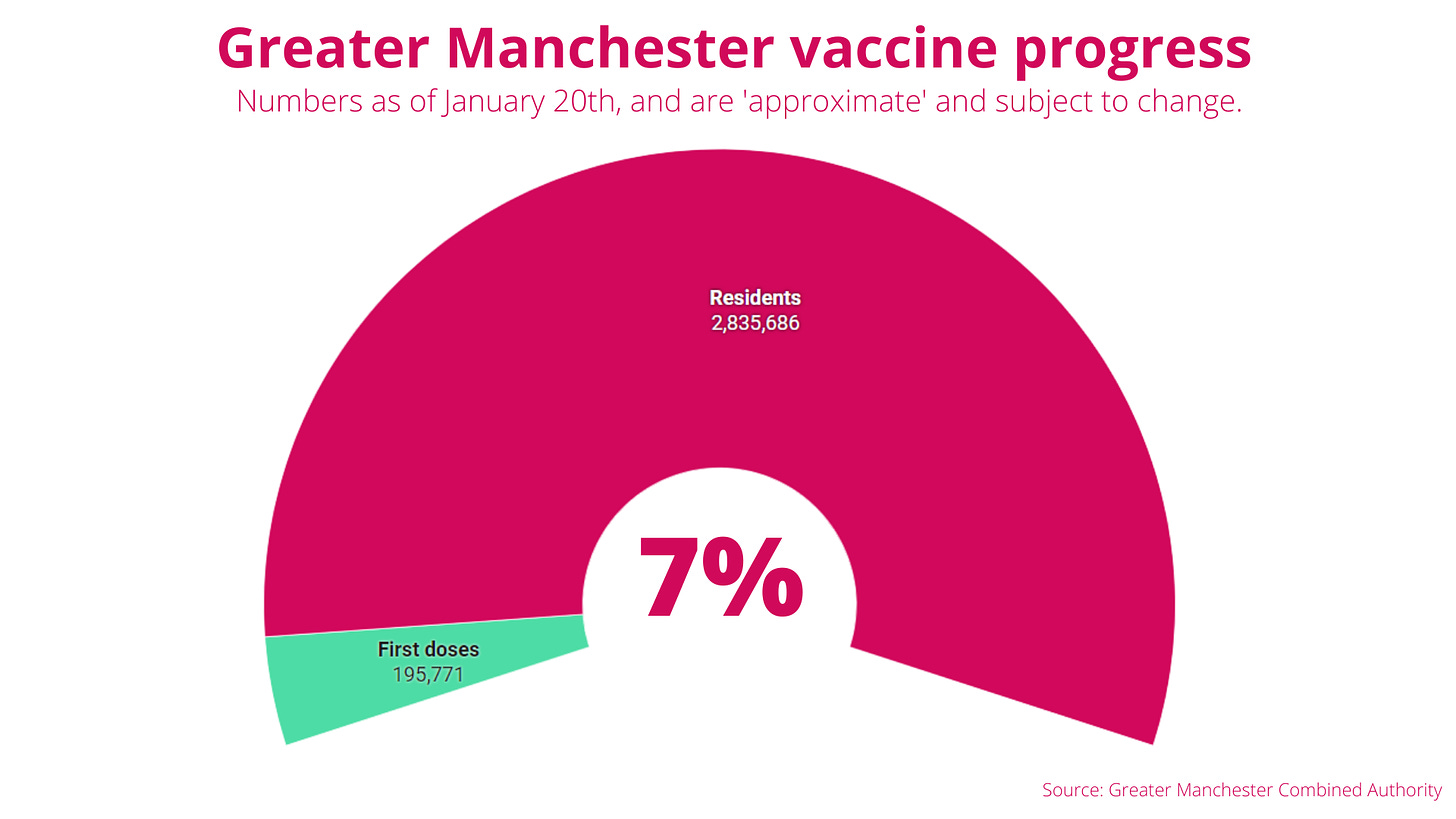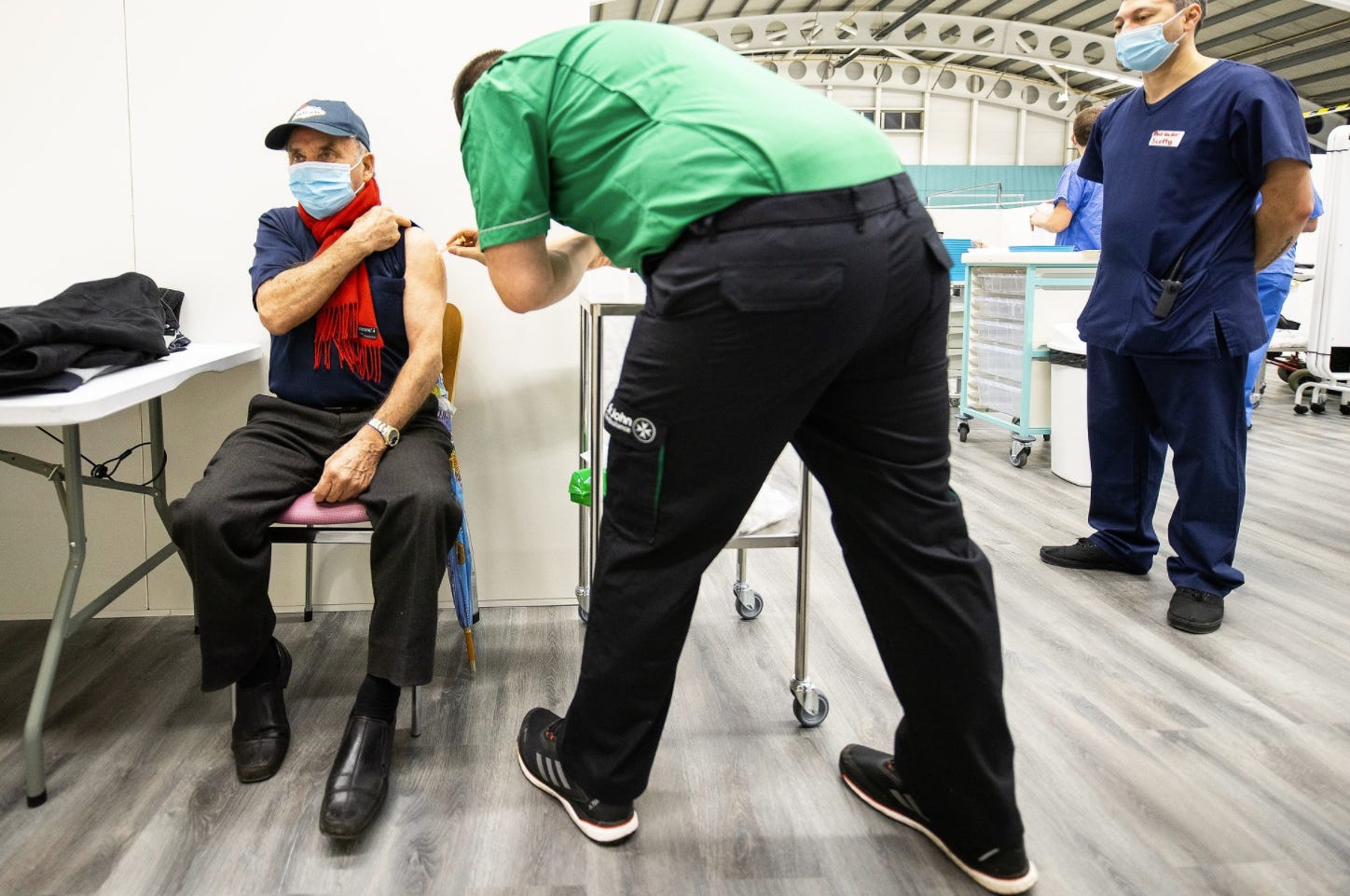My first day as a vaccination volunteer
And how do GM Covid-19 deaths now compare to the previous waves?
Dear Millers — a thin layer of snow is covering the ground in many of our neighbourhoods and we have a jam-packed weekly briefing for you, including a report from a vaccine volunteer, the latest Covid-19 data, a very busy letters page and Dani’s recommendations for what to do and try this week.
As always we would be incredibly grateful if you forwarded this newsletter to a few friends or colleagues and encouraged them to sign up to our email list.
The big story: Deaths in the third wave
Infection rates are now consistently falling in Greater Manchester, dropping in every borough in the past week and still well below the national rate, which is also falling. But how bad has this third wave in GM been compared to the spikes we saw in Spring last year and in November?
The graph below gives a sense of that, showing deaths in Greater Manchester hospitals of patients who tested positive for Covid-19. It shows a 7-day rolling average of daily deaths, which reaches just over 50 deaths per day in the worst week last Spring, just over 30 per day in the worst week in November, and almost 25 deaths per day in the week ending last Wednesday. So the current rate of mortality is around half what we saw last April.
Will it rise further? Yes, probably, because hospitalisations are still very high. As of last Wednesday, there were 157 patients who had tested positive for the virus in critical beds in GM hospitals, up from 138 the week before. That’s very close to the November peak of 160 in critical care.
Context: Local health leaders have modelling showing that pressure on the GM NHS system might peak in the next few days. Andy Burnham told journalists last week to expect “a sustained high level of pressure,” for a few weeks.
Vaccinations continue apace. Nationwide, 478,248 people got their first dose in the 24 hours to Saturday, a daily record. We only get the local figures weekly when they are released by the Greater Manchester Combined Authority, but last Wednesday we told you that 7% of GM residents had received their first dose, matching the national rate of progress at that point (also 7%).
If you have seen a claim on social media that you would like us to fact-check, please email editor@manchestermill.co.uk.
This week’s weather
The location of this forecast is Manchester and it’s sourced from the Met Office.
By the legendary Tony Husband, whose ‘Yobs’ strip has been running in Private Eye since the 1980s. Tony is a Mill member and now kindly contributes cartoons for us.
Five stories worth reading
1. An unjustifiable tower block
“How big is the Hulme Street tower? It’s massive. Bloody massive: 55 storeys and providing 853 purpose-built student accommodation units.” So begins an interesting read in Manchester Confidential about a controversial development proposal just off Oxford Road. The piece concludes: “The proposed Hulme Street tower seems to have no justification economically, civically, aesthetically or morally.”
2. Manchester’s Mother Teresa
“A Victorian nun known as the Mother Teresa of Manchester has been classed as a woman “of heroic virtue” by the Vatican, moving her one step closer to becoming Britain’s first female saint of modern times,” reports The Times. “A Vatican bulletin announced yesterday that the Pope had given approval for Elizabeth Prout, who was born in Shrewsbury in 1820, to be given the title “venerable”, the third step of five on the path to sainthood.”
3. Boohoo to buy Debenhams brand
Manchester-based online retailer Boohoo is buying up the online presence of Debenhams, it was reported this morning. But it won’t retain the stores. It’s a stark reminder of how fast retail is changing — a company founded in 2006 buying the intellectual property of a 243-year-old department store, the FT notes in its story. Another online retailer, Asos, is looking to buy other bits of the Arcadia retail empire, including Topshop and Topman. Boohoo’s stock was up almost 4% in morning trading.
A picture taken at Fletcher Moss last week, by Mill reader Tom Wainright.
4. Request to adapt flood defences
Workers at Fletcher Moss Park have called for better environmental management after floods, reports the BBC. The secretary of Friends of Fletcher Moss Park and Parsonage Gardens, said: "We would like [the Environment Agency] to be looking upriver to the Goyt and the Tame and what can be done to keep water there — being able to drain into the land and not come down as far as Manchester.”
5. The long-lost world of Stockport market
“When the British Culture Archive started posting Heidi Alexander’s photos of Stockport, Greater Manchester, earlier this year the response was overwhelming,” says The Guardian, alongside some wonderful pictures of the town’s old market. “Locals got in touch sharing names of the people in the pictures and poignant memories. An exhibition of her work and a book are both planned once the pandemic is under control.”
A beautiful scene in the Southern Cemetry, posted by Laura Dickinson in the Chorlton Facebook group.
Our plans this year
This year The Mill will go from being an experimental lockdown project run by one person to a staffed-up and sustainable news organisation that can serve Greater Manchester for years to come.
We want to hire our first graduate reporter in the coming months and to expand our exceptional network of freelance writers, and we are well on the way to being able to do that. We don’t have any investors and we aren’t part of a big corporate media company, so every pound we spend has to be generated ourselves by growing our membership.
Almost 100 new members have joined in January so far, and we’re extremely grateful for their support. If you haven’t joined yet, you can do so by clicking the button below.
Monday feature: My first day as a vaccination volunteer
By Judith Suckling
On a dark, cold morning last week, I witnessed some glimmers of hope. Manchester was in a state of emergency as the River Mersey threatened to burst its banks. We were unsure whether anyone would make it to the Covid-19 Vaccination Centre.
At the Chancellors Hotel in South Manchester, all volunteers were offered a lateral flow test on arrival. An emergency exit primed for anyone that tested positive. Still dark at 8am, a line of eager OAPs waited for us. Some had not left their homes for a year.
The atmosphere was full of chirpy chatter. One woman told me she was happy to “be on a day out.” Another bumped into an old friend. One man asked where the best place for a selfie was? “I’m putting this on the television,” he said. Another man who had Parkinson’s was accompanying his wife. He said the last year of shielding had been worth it because he had had his vaccine at the Etihad Stadium.
Alongside the happiness, there was also fear. A lady cried and wanted the on-duty GP to stand with her while she had the injection. He was patient and reassuring.
Overprotective husbands refused to part with their wives even for a separate seat. Wives pushed heavy wheelchairs with their husbands in, not wanting help from the standing-by volunteers. They had spent the last year keeping each other safe and were not about to stop now. The receptionist asked them questions which got a laugh or left sadness hanging in the air: Do you have an email address? Are you pregnant? Do you have a next of kin?
It was moving, uplifting, and yes — hopeful too.
Letters to the editor
I couldn't agree more with Dani Cole about cat cafés in your last Monday briefing. What cat wants to be stuck indoors with a succession of complete strangers? Plus the cats in the Manchester café were obtained from breeders, who really shouldn't be encouraged when there are thousands of gorgeous cats in shelters and sanctuaries. What cats need is a loving home with either a garden safe from traffic or a safe space to play, plenty of food, water and warmth, and regular routines. Cat cafés do not provide this. No cat lover should go to one. Cathy Thomas-Bryant, Cadishead.
Until I retired in March 2020, I worked in Transport for Greater Manchester’s Bus Reform Team, so naturally, I was interested in your article on bus reform. Usually, when I read about something I’m familiar with, I’ll spot inaccuracies, or the piece as a whole won’t ring true. Your article suffered from neither defect: it was a balanced piece that accurately captured the problems of bus deregulation, the policy background to bus reform, and the challenges Greater Manchester faces in transforming the bus network back into one that is fully integrated with the rest of the transport network. Nick Hallett, Didsbury.


I lived in the centre of Didsbury for 11 years. During that time 1,200 buses passed through the village centre EVERY DAY, mostly empty, causing pollution, noise, traffic congestion and damaging roads, especially the gullies, which rate payers then had to pay to have repaired. This is also true of all the centres, such as Withington and Fallowfield, which line Wilmslow Road into the City centre. Only recently has the damage to health from diesel fuel been recognised. How much damage has it done to those children whose schools are near Wilmslow Road and to older people with the recognised risk of dementia? The sooner bus routes are franchised and not a free for all, the better. Moira Sykes, Didsbury.
I thoroughly enjoyed Mollie Simpson’s account of Annie Kenney’s life, particularly focusing on how there can be additional difficulties in telling the stories of working-class activists. That being said, this story is a welcome reminder for all of us in the media (myself included) to go the extra mile and platform the voices of those who are often misheard, ignored, or shunned. I look forward to Mollie’s next piece. Ethan Davies, East Salford.
I wish these stories (‘From the Oldham mills to political revolution: The irrepressible life of Annie Kenney’) had been taught whilst I was in school. We did learn about the Industrial Revolution but it referred to events 150 years in the past. How enlightened would it have been to learn about the 'real people' of Manchester, in a time closer to the 1950s and 60s when I was at school and how they changed our country and the world. I am a product, via education, of all they achieved. Anne Forster, Worcestershire.
Another great city-centre shot by longtime Miller Nathan Whittaker, who posts as manc-wanderer on Instagram and Twitter, and sells some of his prints online.
Things to do this week
Podcast | If like us, you’ve already enthusiastically dived into The Stranger Times by C.K McDonnell (previously our Book of The Week) then The Stranger Times podcast is a perfect accompaniment.
What to expect: “Each episode features a short story from The Stranger Times world, written by C.K. and narrated by one of his uber-talented friends from the comedy circuit.”
Exhibition | OT Creative Space in Old Trafford is running a window exhibition showcasing the work of young people aged 13 – 24, part of The Gift Shop Project. Pop along if you’re nearby — you can find them on 27 Ayres Road, Old Trafford.
Photography | The photography network Redeye is presenting their first digital Hothouse event in partnership with Fuse on Saturday from midday until 4pm. Whether you’re a budding photographer or a seasoned professional, this event is free and open to all. Register here.
What’s in store: “This will be an opportunity to experience the current artistic activity of the photographic community, and get a sense of the breadth of talent working now.”
Documentary photographer Ciara Leeming will among those presenting their work — members will have already seen her Levy Lockdown Portraits, which we shared in December.
Talk | On Tuesday, The Modernist Society is hosting a talk ‘Landscapes of Post-War Infrastructure’ with Jen Orpin, a Manchester-based contemporary figurative painter and Gareth E. Rees, the author of Unofficial Britain: Journeys Through Unexpected Places. Tickets here.
Music | The Old Courts is running Independent Venue Week. From today until Sunday you can enjoy five livestreamed events. Tickets are ‘pay as you feel’. Head over to their website to book your place.
To recommend something for our Things To Do, email editor@manchestermill.co.uk or tweet @danithecole, who compiles the list.
Obituary: Peter Swan
Peter Swan was a professional footballer who made 19 appearances for England and captained Bury to promotion into Division 3 in the 1973-1974 season. Born in South Yorkshire, he started his career at Sheffield Wednesday at the age of 15, whilst working part-time in Armthorpe Colliery. Despite his skill on the pitch, Swan is best remembered for his involvement in a betting ring which was uncovered by the Sunday People newspaper in 1964 and resulted in an eight year ban from football.
The BBC’s obituary explains more:
"We lost the game fair and square," Swan told The Times in a 2006 interview about the incident. "But I still don't know what I'd have done if we'd been winning. It would have been easy for me to give away a penalty or even score an own goal. Who knows?"
Swan said England boss Sir Alf Ramsey told him he was "top of the list" for the World Cup, coincidentally the Ipswich manager that day in 1962, but that dream was never realised.
Peter Swan, born October 8 1936, died January 20 2021.
Give yourself a gift
Join The Mill as a member today to get our high-quality journalism in your inbox five days a week and be better informed this year. Our members say getting Mill stories lifts their mood and makes them feel more connected to the world around them. In our recent survey, one member wrote:
Nowhere else are there in-depth articles about where we live. This paper is unique. It contains the sort of writing you get in the broadsheets, but it's not all about London!
















Great read thankyou